A sumo stable master who hit a teenage apprentice on the head with a beer bottle the day before the youngster died was permanently banished from the Japanese sport yesterday.
The Japan Sumo Association dismissed Tokitsukaze, whose real name is Junichi Yamamoto, as the head of one of 53 stables which make up the lucrative circuit of professional sumo tournaments around the country.
The association's top officials also agreed to cut their own pay by up to 50 percent for four months to atone for their failure to prevent the tragedy.
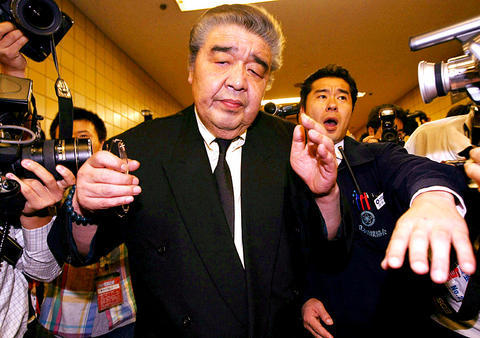
PHOTO: AFP
Tokitsukaze, 57, has admitted he hit novice Takashi Saito, 17, on the knee and head with a glass bottle the day before his sudden death in June. The stable elder has also admitted senior wrestlers used a baseball bat to beat the teenager, who had repeatedly tried to run away from the stable.
The stable master has insisted the death was an accident but police are investigating the death as a possible criminal case.
The sumo association's 10-member board unanimously approved Tokitsukaze's dismissal at a special meeting, its president Kitanoumi told reporters.
"Tokitsukaze not only injured [Saito's] face by hitting him with a beer bottle but also connived in the violence used by senior wrestlers of the stable toward the late Mr. Saito," he said after questioning the stable master.
Dismissal is the authority's severest penalty, preventing Tokitsukaze from ever returning to Japan's ancient sport. He is only the second stable master to be expelled by the association in its more than 80-year history.
Saito collapsed during practice on June 26. He was taken to hospital where he was pronounced dead from heart failure.
Saito's death has turned the spotlight on harsh acts committed against sumo apprentices in the name of training or punishment.
Coming on the heels of allegations of match-fixing and suspicions that a grand champion faked injuries, it's little wonder, perhaps, that the sport is struggling to attract new novices.
"I heard new recruits are canceling," said Muneyoshi Fujisawa, a 55-year-old retired wrestler who reached the upper echelons of the ancient sport in his youth and maintains close contact with the closed world of sumo.
Even before the latest scandal the number of apprentices was on the decline. The sumo authority approved 87 new novices last year, down 60 percent from the peak of 223 in 1992 when the nation was in the midst of a sumo boom thanks to the popularity of two Japanese wrestling brothers.
Even in Fujisawa's day, when he went by the name of Kotonofuji in the ring, training was very hard.
"It was really killing me. Sand or salt was often shoved into the mouth, and a bamboo sword was used to hit wrestlers. I was beaten, and beaten," said Fujisawa, who spent 20 years in the ring and five coaching.
Some wrestlers, like Fujisawa, say that although they initially bore a grudge against senior disciples for hazing, in later years they felt grateful.
"You would eventually realize that the huge resentment, pain and anguish drove you to move up," he said. "Any good players in any sport must have gone through beating or bullying."
Sumo is "in an unprecedented crisis" due to the falling number of children and changing lifestyles, says a veteran journalist who has followed the sport for two decades.
"Gifted children take up golf, soccer and other sports as their parents don't bother to send them to the scary world," he said, asking not to be named.
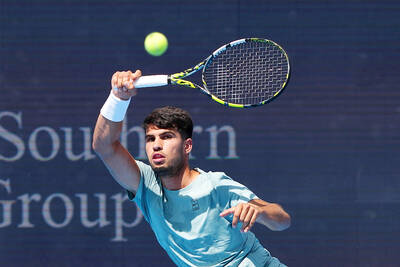
Carlos Alcaraz on Sunday fought through a second-set slump to post a roller-coaster 6-1, 2-6, 6-3 victory over Damir Dzumhur in his opening match at the Cincinnati Open. The Spaniard, playing his first tournament since losing to Jannik Sinner in the Wimbledon final, raced through the first set, but completely lost his way in the second, dropping his serve twice against the 33-year-old Bosnian. Alcaraz regained his intensity and cut down his errors in the third set as a seventh ace took him to a match point that was converted when Dzumhur fired wide. “It was just a roller coaster,” said the second
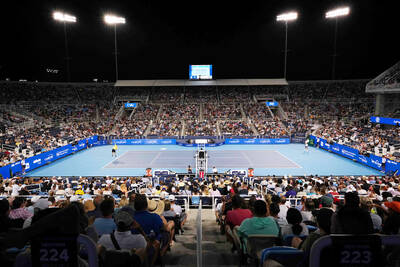
NEXT ROUND: World No. 1s Jannik Sinner and Aryna Sabalenka opened their title defenses with straight-sets wins, while Iga Swiatek and Taylor Fritz also advanced Jannik Sinner and Aryna Sabalenka got their title defenses off to smooth starts as they powered into the third round of the ATP-WTA Cincinnati Open on Saturday. The men’s and women’s top seeds, each ranked No. 1 in the world, were both competing for the first time since Wimbledon, where Sinner lifted the title and Sabalenka bowed out in the women’s semi-finals. Sinner crushed Colombian Daniel Elahi Galan 6-1, 6-1 in steamy afternoon weather, while Sabalenka beat 2023 Wimbledon champion Marketa Vondrousova 7-5, 6-1 under the lights of the night session. Sabalenka needed 54 minutes and a service break in the final game
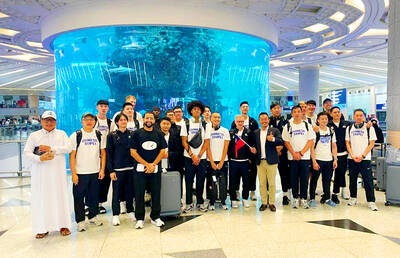
Taiwan’s men’s basketball team on Monday clinched a spot in the FIBA Asia Cup quarter-finals with a 78-64 win over Jordan in Saudi Arabia, securing their best finish in the tournament since placing fourth in 2013. The win was sweet revenge for Taiwan, who were denied a quarter-final spot by Jordan at the same stage of the previous Asia Cup in 2022 after blowing a nine-point lead in the final minute and losing 97-96 on a half-court buzzer-beater. “History is part of the journey,” Taiwan head coach Gianluca Tucci said when asked about the 2022 collapse of the team, who he did
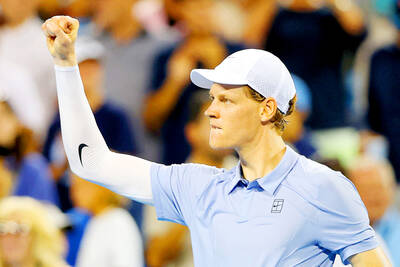
TECH ISSUES: Before Sinner’s match against Diallo the lights went out at the courts, and during it the electronic line-calling system partly failed and an alarm sounded Jannik Sinner on Monday ignored technical issues interruptions and a blaring alarm to defeat Gabriel Diallo 6-2, 7-6 (8/6) on a day of distractions at the Cincinnati Open. The top-seeded defending champion got down to business against the 35th-ranked Canadian, who was plagued by eight first-set double faults and 49 unforced errors in the match as he faced the best in the world. Sinner recovered smoothly from an early break down and had his hands full on his way into the fourth round, sending over an ace on match point after saving a set point in the tiebreaker. Play was stopped briefly with